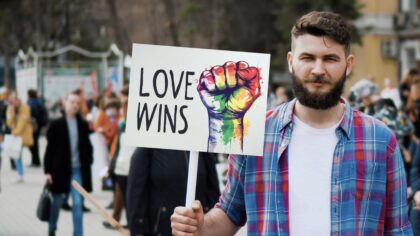I felt a little pang of being left out this week. There was a group of clergy engaging in some important public ministry, and I felt both proud for their prophetic witness and also a bit sad that I wasn’t there with them.
You may have heard that a local man went to the public library and checked out a hundred books affirming of Jewish, Black, and LGBTQ identities, then proceeded to burn those books on video while commenting about cleansing the library. Maybe he thought he was protecting the community. But the community didn’t ask to be protected from identity affirming literature.
So, how did the community respond? By replacing the burned books tenfold. In a spirit of connection, people have provided more than a thousand books to replace the hundred destroyed. With a bold collective voice, people from a broad spectrum of faith traditions declared their commitment to nurture wholeness and hope.
Hatred seems scary. Something to hide from. And yet, hatred at its core is an expression of fear. And fear disconnects us. When we choose to fight hatred, sometimes we just fuel the fire of that fear. But when we respond to hatred from a place of connection and love, we overcome the damage of hatred with care for the people around us.
At the forefront of this message of love and connection was the Interfaith Group Against Hate (IGAH). It’s a collective of spiritual communities committed to building authentic, safe (or “safe enough”) connection with one another. The outcome of that internal relationship building also has an external expression, made more powerful when a group of people who know and trust one another can speak with one powerful voice.
We are not a part of IGAH. It would require a commitment from our congregation that we weren’t willing to make when we were invited last year. We would need to embrace being co-creators, with at least a few people attending gatherings on a regular basis (because that’s how relationships get built). We’d need to host gatherings at our site on occasion and make a financial contribution. Since the congregation was reluctant to devote energy to these interfaith relationships, I am less connected with the clergy involved. Thus, I was not a part of the public statement declaring a commitment to respond to hatred by nurturing wholeness in the world.
And that’s OK. Yes, there is a part of me that insisted a bit shamefully, I should have been there with them. And also, they expressed my own thoughts beautifully. From a variety of faith perspectives, they conveyed an inspiring commitment to healing what was wounded and fostering connection and joyful affirmation in the wake of a destructive act.
To that part of me that insists that I should be and do everything, I can offer some reassurance that it’s important to say a sacred no to some things. This interfaith group is doing amazing work, and also: Saying yes to anything means saying no to other things. While IGAH was mustering support and arranging a press conference and scripting public statements, my time was not squandered. I was doing ministry. Ministry that I would have had to say no to—or at least postpone—if I had been part of an urgent community response.
As a community, the commitments we make today are meaningful and important, and hopefully we make those commitments based on a clear sense of our values. Maybe there will come a time in the future when our values call us to devote our energies in different directions. Whatever our commitments, though, we will have to say no to some things. And others will faithfully tend the things in our world that need tending.
To what do your values call you to say yes? What do you need to say no to in order for your yes to be sustainable and life-giving?
Share this post:
